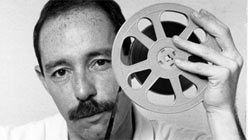O.K. I know. One major reason to go to the annual San Francisco International LGBT Film Festival is to see and be seen. We stand in long lines checking out the various characters in the inevitably large crowd while waiting to be let into the theater. Once inside, we watch hot and humorous fantasies or stirring melodramas featuring attractive, and often half-nude, characters as they frolic across the big screen. Even by today’s standards, when LGBT characters real and imagined are much more visible than they were 36 years ago, the festival remains vital by collecting a diversity of queer images from around the world and presenting them in concentrated form for eleven glorious days.
As the years roll on, I find myself increasingly drawn to the festival’s documentary section. Even though the history of the gay liberation movement is short, it is populated with heroic (and sexy) characters whose brave and often outrageous exploits secured the relative freedom I enjoy today. So, consider this a big thanks to the filmmakers who spend years researching these lives and this history and then struggle (also heroically) to bring these stories to screens large and small all around the globe.
This year’s festival opens with Jeffrey Schwarz’s Vito (Thursday, June 14, 7pm, Castro Theatre), a loving portrait of Vito Russo, the gay activist and cinema pioneer. Russo is most famous for his book The Celluloid Closet: Homosexuality in the Movies, which unearthed queer images from throughout film history and showed how Hollywood had devolved from a nuanced depiction of gays and lesbians in early silent cinema to the development of various stereotypes that marginalized homosexuality as the medium progressed. These portrayals went through a particularly brutal period in the ’60s and early ’70s, when gay and lesbian characters were often portrayed as either homicidal or suicidal. Russo’s book, which he developed and presented as a traveling clip-show for over a decade, caused change by unearthing these images, identifying patterns, and bringing this insidious homophobia to light.
What I found most interesting about Vito was how deeply it explores the creative process of researching and developing an idea (a life’s work, really) over a long period of time. The Celluloid Closet is a seminal work of LGBT history, so it is a unique pleasure to be able to see how it arose from humble beginnings. The seed of the idea came from film screenings that Russo organized at the Gay Activists Alliance, an old New York fire house that was host to various LGBT groups in the early 1970s. It was heartening to see such a monumental achievement begin so simply and then grow and develop in scope and power, inhabiting the life of its creator as it slowly took shape.




